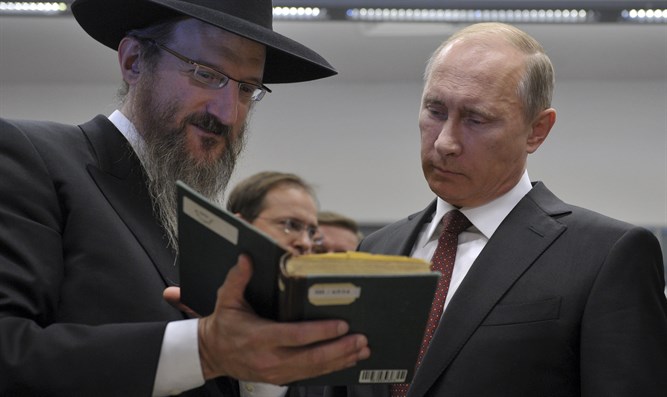Yochanan Visser, 19/01/20 20:10
How could Russian President Vladimir Putin’s personal feelings towards Israel – and the Jews – impact Russian policy on key issues?
Russian President Vladimir Putin is coming to Israel this week to attend the 75th commemoration of the liberation of the Auschwitz death camp where 1.41 million Jews were gassed to death during World War II.
The commemoration is part of the Fifth World Holocaust Forum (WHF) and is one of the biggest events ever held in Israel with at least 36 world leaders attending the event marking the 75th anniversary of the liberation of Auschwitz by the Red Army.
The event was organized by the State of Israel, Holocaust museum Yad Vashem and WHF and will focus on the explosion of anti-Semitism in the Western world.
Putin’s visit to Israel, his first in eight years was put in doubt last month when a new mini-crisis erupted between Israel and Russia over the detention of Israelis who traveled to Russian airports where they were questioned and where their luggage was searched.
The move seemed to be a message to Israel over the barring of thousands of Russians for entering Israel each year because of security considerations.
Putin’s attitude toward Israel could be dubbed as ambivalent.
On one hand, he’s allowing Israel to carry out airstrikes against Iran-related targets in Syria despite the deployment of the S-300 missile shield which is designed to shoot down incoming fighter jets except for Israel’s F-35 Adir stealth warplane.
On the other hand, the Russian leader isn’t afraid to seek a confrontation with the Jewish state such as the crisis that erupted over the alleged Israeli downing of a Russian IL-20 reconnaissance plane over northwest Syria in September 2018.
The Russian leader later absolved Israel after receiving information by Israeli Prime Minister Binyamin Netanyahu who proved Israeli warplanes were already returning to Israel after carrying out a strike at an Iranian base near Lebanon at the time of the downing of the IL-20.
Last year, a new mini-crisis between Israel and Russia erupted after the Russian authorities arrested and detained the 26-year-old Israeli tourist Na’ama Issachar at the airport of Moscow.
Issachar was caught having 9.5 grams of marijuana in her luggage but the woman denied having knowledge about the origins of the drug.
She was later sentenced to 7.5 years in prison and that’s where a national campaign led by Issachar’s mother to secure the release of Na’ama began.
Yaffa Issachar even threatened to block Putin from attending the Auschwitz commemoration lest he didn’t secure the release of her daughter and called upon PM Netanyahu to use his special relationship with the Russian President to convince him to use his right to pardon prisoners.
Netanyahu has talked to Putin about the issue on several occasions but only last week he started to indicate that he could have success and posted an optimistic video on his webpage about his latest conversation with Putin.
This weekend the Russian paper Kommersant reported, citing unknown Russian officials, that Putin indeed considers releasing Issachar despite irritation over an Israeli refusal to do the same with Russian citizen Alexei Burkov who has been arrested by Israel and is waiting for extradition to the US over cybercrimes charges.
The question is now again what moves Putin in his somewhat complicated relationship with Israel.
The answer to this question could be found in what happened to the former KGB chief during his early youth when he was living with his parents in an apartment in St. Petersburg.
Israeli media have already published some details about these apparently fateful years with the Jewish Telegraph Agency (JTA) reporting in 2018 that an elderly Jewish couple in the apartment building where Putin lived “cared for the boy”.
JTA didn’t report any details about this “care” but indicated that this could be the reason Putin has a weak spot for Jews and Israel as has also become apparent from the fact that the Russian President purchased an apartment in Tel Aviv for his former teacher Mina Yuditskaya.
Now, however, the Shabbat sheet Dwash Shabbat, a publication with Jewish teachings composed by a group of Jews close to Tiberias rabbi and kabbalist Dov Kook, revealed new details about Putin’s relationship with his Jewish neighbors.
Dwash Shabbat got its information from Russian Chief Rabbi Berel Lazar the head of the Chabad movement in Russia.
According to the Dwash Shabbat Putin’s parents were hard-working very poor Russians who barely had enough money to feed their kid.
The Jewish couple was the only one that took care of the young Putin despite the presence of other Russian families in the building who were aware of the problematic situation in the family of the Russian leader.
Every time the Jewish neighbors noticed that the young Putin was home alone without food they prepared him a decent meal and also invited him to their Shabbat table while also inviting him for the Jewish holidays.
This exposed the young Putin to Jewish rituals and prayers since the couple was religious.
The neighbors even bought clothes for the boy and made sure he wouldn’t be without basic needs.
This, and not the fact that Putin also cares for the more than one million residents of the former Soviet Union who now reside in Israel seems to be the real reason for Putin’s weak spot regarding Israel and the Jews.






